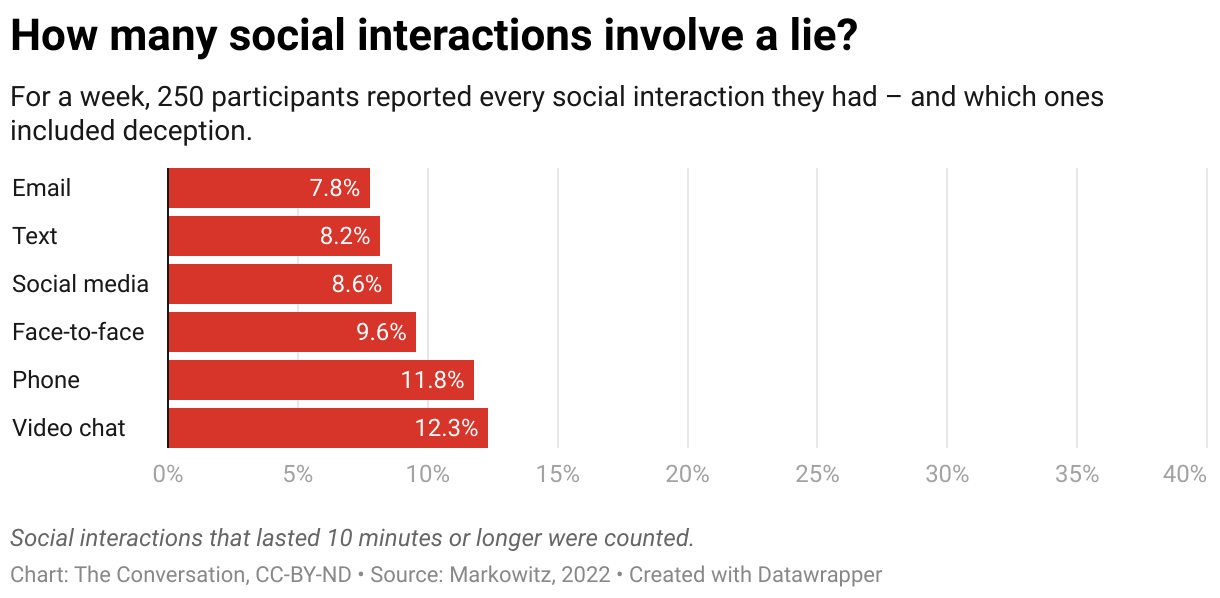Commentary: How often you lie depends on who you are talking to
Does a personal connection increase or decrease the likelihood of sticking to the truth? This Wake Forest University researcher explains how the recipient and the medium affect telling the truth.

File photo of President Joe Biden and his son Hunter Biden. A federal indictment filed in Delaware says Hunter Biden lied about his drug use when he bought a firearm in 2018 while struggling with addiction to crack cocaine. (AP Photo/Andrew Harnik, File)

This audio is generated by an AI tool.
WINSTON-SALEM, North Carolina: Prominent cases of purported lying continue to dominate the news cycle. United States President Joe Biden's son Hunter Biden was charged with lying on a government form while purchasing a handgun. Republican Representative George Santos allegedly lied in many ways, including to donors through a third party in order to misuse the funds raised. The rapper Offset admitted to lying on Instagram about his wife, Cardi B, being unfaithful.
There are a number of variables that distinguish these cases. One is the audience: The faceless government, particular donors and millions of online followers, respectively. Another is the medium used to convey the alleged lie: On a bureaucratic form, through intermediaries and via social media.
Differences like these lead researchers like me to wonder what factors influence the telling of lies. Does a personal connection increase or decrease the likelihood of sticking to the truth? Are lies more prevalent on text or email than on the phone or in person?
An emerging body of empirical research is trying to answer these questions, and some of the findings are surprising. They hold lessons, too - for how to think about the areas of your life where you might be more prone to tell lies, and also about where to be most cautious in trusting what others are saying. As the recent director of The Honesty Project and author of Honesty: The Philosophy And Psychology Of A Neglected Virtue, I am especially interested in whether most people tend to be honest or not.
FIGURING OUT THE FREQUENCY OF LIES
Most research on lying asks participants to self-report their lying behaviour, say during the past day or week. (Whether you can trust liars to tell the truth about lying is another question.)
The classic study on lying frequency was conducted by psychologist Bella DePaulo in the mid-1990s. It focused on face-to-face interactions and used a group of student participants and another group of volunteers from the community around the University of Virginia.
The community members averaged one lie per day, while the students averaged two lies per day. This result became the benchmark finding in the field of honesty research and helped lead to an assumption among many researchers that lying is commonplace.
But averages do not describe individuals. It could be that each person in the group tells one or two lies per day. But it’s also possible that there are some people who lie voraciously and others who lie very rarely.
In an influential 2010 study, this second scenario is indeed what Michigan State University communication researcher Kim Serota and his colleagues found. Out of 1,000 American participants, 59.9 per cent claimed not to have told a single lie in the past 24 hours. Of those who admitted they did lie, most said they’d told very few lies. Participants reported 1,646 lies in total, but half of them came from just 5.3 per cent of the participants.
This general pattern in the data has been replicated several times. Lying tends to be rare, except in the case of a small group of frequent liars.
DOES THE MEDIUM MAKE A DIFFERENCE?
Might lying become more frequent under various conditions? What if you don’t just consider face-to-face interactions, but introduce some distance by communicating via text, email or the phone?
Research suggests the medium doesn’t matter much. For instance, a 2014 study by Northwestern University communication researcher Madeline Smith and her colleagues found that when participants were asked to look at their 30 most recent text messages, 23 per cent said there were no deceptive texts. For the rest of the group, the vast majority said that 10 per cent or fewer of their texts contained lies.
Recent research by David Markowitz at the University of Oregon successfully replicated earlier findings that had compared the rates of lying using different technologies. Are lies more common on text, the phone or on email? Based on survey data from 205 participants, Markowitz found that on average, people told 1.08 lies per day, but once again with the distribution of lies skewed by some frequent liars.

Not only were the percentages fairly low, but the differences between the frequency with which lies were told via different media were not large. Still, it might be surprising to find that, say, lying on video chat was more common than lying face-to-face, with lying on email being least likely.
A couple of factors could be playing a role. Recordability seems to rein in the lies - perhaps knowing that the communication leaves a record raises worries about detection and makes lying less appealing. Synchronicity seems to matter too. Many lies occur in the heat of the moment, so it makes sense that when there’s a delay in communication, as with email, lying would decrease.
DOES THE AUDIENCE CHANGE THINGS?
In addition to the medium, does the intended receiver of a potential lie make any difference?
Initially you might think that people are more inclined to lie to strangers than to friends and family, given the impersonality of the interaction in the one case and the bonds of care and concern in the other. But matters are a bit more complicated.
In her classic work, DePaulo found that people tend to tell what she called “everyday lies” more often to strangers than family members.
To use her examples, these are smaller lies like “told her (that) her muffins were the best ever” and “exaggerated how sorry I was to be late". For instance, DePaulo and her colleague Deborah Kashy reported that participants in one of their studies lied less than once per 10 social interactions with spouses and children.
However, when it came to serious lies about things like affairs or injuries, for instance, the pattern flipped.
Now, 53 per cent of serious lies were to close partners in the study’s community participants, and the proportion jumped up to 72.7 per cent among student volunteers. Perhaps not surprisingly, in these situations people might value not damaging their relationships more than they value the truth. Other data also finds participants tell more lies to friends and family members than to strangers.
INVESTIGATING THE TRUTH ABOUT LIES
It is worth emphasising that these are all initial findings. Further replication is needed, and cross-cultural studies using non-Western participants are scarce. Additionally, there are many other variables that could be examined, such as age, gender, religion and political affiliation.
When it comes to honesty, though, I find the results, in general, promising. Lying seems to happen rarely for many people, even toward strangers and even via social media and texting. Where people need to be especially discerning, though, is in identifying - and avoiding - the small number of rampant liars out there. If you’re one of them yourself, maybe you never realised that you’re actually in a small minority.
Christian B Miller is AC Reid Professor of Philosophy at Wake Forest University. This commentary first appeared in The Conversation.


















